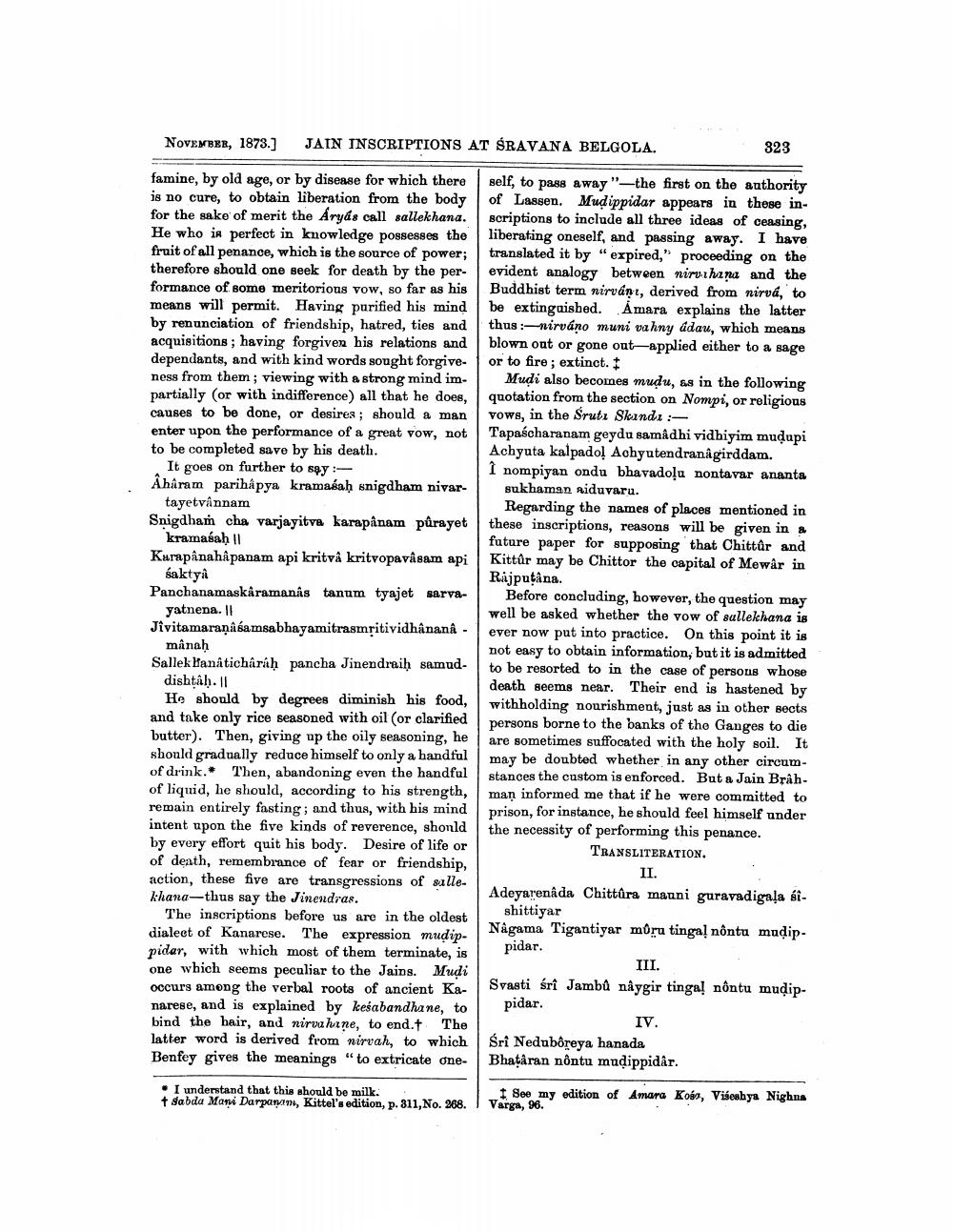________________
JAIN INSCRIPTIONS AT SRAVANA BELGOLA.
NOVEMBER, 1873.]
famine, by old age, or by disease for which there is no cure, to obtain liberation from the body for the sake of merit the Aryás call sallekhana. He who is perfect in knowledge possesses the fruit of all penance, which is the source of power; therefore should one seek for death by the performance of some meritorious vow, so far as his means will permit. Having purified his mind by renunciation of friendship, hatred, ties and acquisitions; having forgiven his relations and dependants, and with kind words sought forgiveness from them; viewing with a strong mind impartially (or with indifference) all that he does, causes to be done, or desires; should a man enter upon the performance of a great vow, not to be completed save by his death.
It goes on further to say :Âharam parihapya kramaśaḥ snigdham nivartayetvânnam
Snigdham cha varjayitva karapânam pûrayet kramaśaḥ || Karapanahapanam api kritvå kritvopavâsam api inkty
Panchanamaskaramanâs tanum tyajet sarvayatnena. ||
Jivitamaranasamsabhayamitrasmṛitividhânanâ -
mânaḥ
Sallek Fanaticharáḥ pancha Jinendraiḥ samuddishṭaḥ. I
He should by degrees diminish his food, and take only rice seasoned with oil (or clarified butter). Then, giving up the oily seasoning, he should gradually reduce himself to only a handful of drink. Then, abandoning even the handful of liquid, he should, according to his strength, remain entirely fasting; and thus, with his mind intent upon the five kinds of reverence, should by every effort quit his body. Desire of life or of death, remembrance of fear or friendship, action, these five are transgressions of sallekhana-thus say the Jinendras.
The inscriptions before us are in the oldest dialect of Kanarese. The expression muḍippidar, with which most of them terminate, is one which seems peculiar to the Jains. Mudi occurs among the verbal roots of ancient Kanarese, and is explained by kesabandhane, to bind the hair, and nirvahane, to end. The latter word is derived from nirvah, to which Benfey gives the meanings "to extricate one
I understand that this should be milk.
+ sabda Mani Darpanam, Kittel's edition, p. 311, No. 268.
self, to pass away"-the first on the authority of Lassen. Mudippidar appears in these inscriptions to include all three ideas of ceasing, liberating oneself, and passing away. I have translated it by "expired," proceeding on the evident analogy between nirvihana and the Buddhist term nirvánt, derived from nirvá, to be extinguished. Amara explains the latter thus: nirváno muni vahny ádau, which means blown out or gone out-applied either to a sage or to fire; extinct.
323
Mudi also becomes muḍu, as in the following quotation from the section on Nompi, or religious Vows, in the Śruti Skandı :Tapascharanam geydu samâdhi vidhiyim muḍupi Achyuta kalpadol Achyutendranigirddam. Î nompiyan ondu bhavadoļu nontavar ananta
sukhaman aiduvaru.
Regarding the names of places mentioned in these inscriptions, reasons will be given in a future paper for supposing that Chittûr and Kittûr may be Chittor the capital of Mewâr in Rajpuina.
Before concluding, however, the question may well be asked whether the vow of sullekhana is ever now put into practice. On this point it is not easy to obtain information, but it is admitted to be resorted to in the case of persons whose death seems near. Their end is hastened by withholding nourishment, just as in other sects persons borne to the banks of the Ganges to die are sometimes suffocated with the holy soil. It may be doubted whether in any other circumstances the custom is enforced. But a Jain Brâhman informed me that if he were committed to prison, for instance, he should feel himself under the necessity of performing this penance.
TRANSLITERATION. II.
Adeyarenâda Chittura manni guravadigala śîshittiyar
Nagama Tigantiyar môru tingal nôntu muḍippidar.
III. Svasti śri Jambû nâygir tingal nôntu mudippidar.
IV.
Śri Nedubôreya hanada Bhațâran nôntu mudippidâr.
I See my edition of Amara Kos, Viseshya Nighna Varga, 96.




